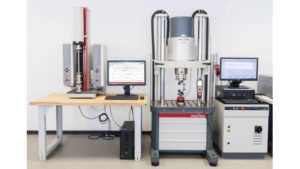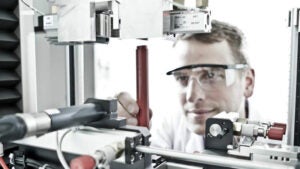New Products for Testing Products
Zwick is concentrating its activities in the plastics field through its own competence center. The “Plastics Testing Initiative” has been underway for two years, and the range of products for testing plastics is being systematically expanded within the framework of this initiative. Helmut Fahrenholz, who heads the competence center, is expecting the plastics market to continue its strong development. “The particular material characteristics, numerous design possibilities, and cost-effective processing continually allow new product innovations which are not possible using other materials. Material characterization plays an important role in development as well as quality assurance. Examples of promising markets are the construction industry, electronics, automotive, packaging, and medical technology.”
As Zwick is already strongly established in the plastics industry with its static testing systems, the goal of the initiative is to further expand the product range. Zwick will now cover the measurement of mechanical characteristics as well as thermal and rheological characteristics in accordance with the basic values stored in CAMPUS®. Testers will carry out static, creep, pendulum impact, drop impact, and high speed tests, as well as extrusion and hardness testers and HDT / vicat machines.
As the world market leader in robotic material and component testing, Zwick has more than 20 years of experience in developing solutions for customers around the world.
Determination of the Melt Index Value
The Mflow (modular flow) is a plastometer which in its basic version covers all tests in accordance with process A (MFR determination) of the ISO and ASTM standards. By adding a displacement sensor, the Mflow can be upgraded to measure the MFR in accordance with process B. An optional weight lift unit allows the machine to be operated entirely automatically. A significant advantage of the machine is the constant temperature in the extrusion barrel, which meets the requirements of the draft ISO/CD 1133-2 standard (moisture sensitive and time-dependent materials). The adaptive parameter configuration (APC) system is a unique innovation which enables the tester to automatically select test parameters to optimize measurement precision. The automatic detection and elimination of the effects of air bubbles in the material guarantees reliable and meaningful results.



